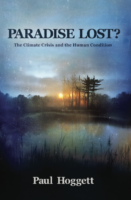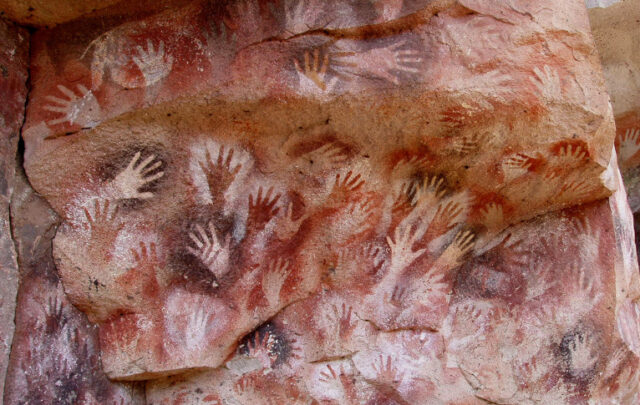 Paul Hoggett is a psychotherapist and was co-founder and first Chair of the Climate Psychology Alliance. He is Emeritus Professor of Social Policy at UWE, Bristol. His new book Paradise Lost? The Climate Crisis and the Human Condition has just been published by the Simplicity Institute. The e-book is available on a ‘pay what you can’ basis here (edit the price as you see fit, including for free) and the paperback is available here (or at most major distributors). In the article below, Paul offers a brief introduction to the themes of Paradise Lost?
Paul Hoggett is a psychotherapist and was co-founder and first Chair of the Climate Psychology Alliance. He is Emeritus Professor of Social Policy at UWE, Bristol. His new book Paradise Lost? The Climate Crisis and the Human Condition has just been published by the Simplicity Institute. The e-book is available on a ‘pay what you can’ basis here (edit the price as you see fit, including for free) and the paperback is available here (or at most major distributors). In the article below, Paul offers a brief introduction to the themes of Paradise Lost?
Climate psychology seeks to place citizens of the West under critical scrutiny. It tries to throw light upon our complicity and inaction in the face of the climate crisis and promote greater ethical and political engagement with the issue. It sees the modern Western self as the product of three great separations or alienations – from external nature, from our own physical nature as mortal beings, and from other selves.
The climate movement has become familiar with the first of these separations, one which construes nature either as an object to be harnessed and exploited or as a dump for our waste. Its roots can be traced back to a Judeo-Christian God which according to Genesis granted mankind dominion over ‘every creeping thing that creepeth upon the earth’. Unsurprisingly this idea, that humans were an exceptional species, was implicit to much of the Enlightenment thought, and to this day the idea of nature as a subject, one which thinks, feels and communicates, remains marginal to the Western intellect.
Less familiar is the second of these separations. The idea that we ourselves are of nature, that we have bodies which feel pain and can break down at any moment – in other words the idea of our physical vulnerability, frailty and mortality – this idea remains shocking to the modern self. In Western culture this separation is typically manifest not in an overt terror of mortality but in a deep anxiety about time, and particularly the passing of time. Time is mortality’s henchman, time means loss, time is the ultimate limit that confronts us, time means money. In its effort to conquer time modern life constantly speeds up – the pace of innovation, the bombardment of new fashions, the mania of social media. Some have dubbed this ‘accelerationism’.
For some people the idea of a world carrying on after they have gone is either incomprehensible or enraging or both, and it can unleash the most terrible envy towards life itself. As COP follows COP and the climate emergency deepens one cannot but help wonder whether there isn’t something of this kind of nihilism in the air, one linked to survivalism. It’s not that survivalists fear a coming catastrophe, the point is that they are already living the catastrophe. The end times have already arrived and conspiracy theories which reveal the secrets of these times proliferate. Today survivalism assumes so many forms. It can be religious or secular, hi or low tech, it can involve an imagined escape to the hills, to New Zealand, to Mars or heaven or to a retreat inside the self.
This brings us to the third great separation constituting the modern self, that is, the separation of the self from other selves. We tend to think of this in terms of the competitive individualism of neoliberal society. But when this individualism merges with human exceptionalism the result can be a veritable allergy to other minds, manifest both in narcissistic individuals and, more stridently, in the life of groups. Whilst for some the existence of different minds comes simply as a surprise (“gosh, you mean my partner doesn’t think like I do”) for others such difference is deeply threatening, as if the existence of difference threatens the very existence of self. In this state of mind ‘being in the right’ takes on existential significance. When, referring to the life of groups, Freud spoke of the ‘narcissism of minor difference’ his point was that for the narcissistic state of mind there is no such thing as a minor difference, all differences are major.
This kind of narcissism has no place in climate politics, we must never lose our respect for, and interest in, the other. The worst thing we can do is imagine that we activists are somehow ‘awake’ whilst the general public are asleep. How easy it then is to then turn their indifference and ambivalence into an opposition, and then turn this opponent into an enemy.
These then are the three great separations which form the modern self. It is vital that we know what we are up against, for the survivalist and the narcissist lurks within all of us.
When we set up the Climate Psychology Alliance in 2012 our strapline was ‘Facing Difficult Truths’. It is no easy task for citizens of the West to face up to the climate crisis. Whilst there are still some in outright denial of climate change most of us tend to deploy ‘soft denial’. In our minds we split off facts and information from meaning and feeling. In this way our thoughts become less troublesome, less likely to prompt us to engage with the issue in any meaningful way. But as the facts accumulate our defences begin to break down. 2018 was the year when this really started to happen, manifested in a wave of what the media called ‘eco anxiety’.
But this anxiety actually refers to two quite different reactions. The survivalist in us feels terror at the prospect of calamity and an overwhelming concern for the security of self and loved ones. Fear fuels fantasies of escape and retreat. The ultimate political expression of this is the authoritarianism resurgent all around us. Like preppers, but on a national scale, we secure our borders and our reserves of food and energy – the politics of the armed lifeboat as it has become known.
But climate distress can lead to an altogether different reaction. Rather than fear and panic the self experiences loss, grief and remorse for that loss, and anger at the causes of that loss. These moral anxieties provide the condition for real ethical/political engagement, one which is capable of transcending all that separates us. This reaction grounds itself upon recognition of our inextricable dependency, both upon nature, our own bodily nature and upon others. This ethics of individual humility is the antithesis to the exceptionalism of the modern self.
The e-book is available on a ‘pay what you can’ basis here (edit the price as you see fit) and the paperback is available here (or at most major distributors).





